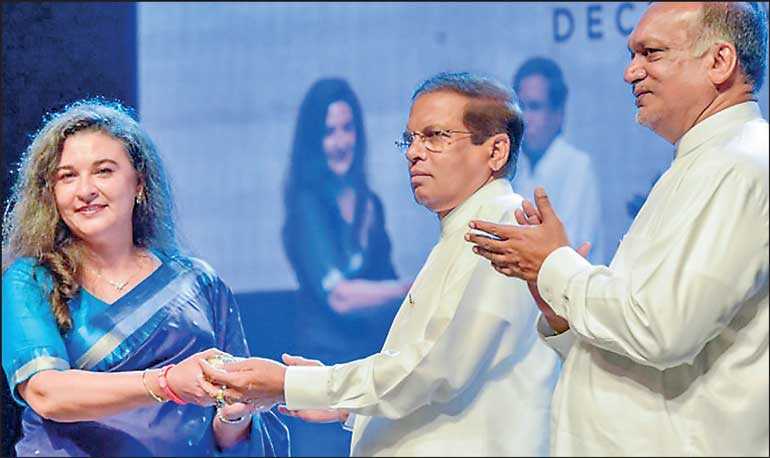Wednesday Feb 18, 2026
Wednesday Feb 18, 2026
Friday, 12 April 2019 00:00 - - {{hitsCtrl.values.hits}}

The Government yesterday deposited with the Director General of the ILO the instrument of ratification of the Protocol of 2014 to the Forced Labour Convention, 1930 , thereby becoming the second country in Asia and thirty-first worldwide to ratify the Protocol.
President Maithripala Sirisena presented the instrument of ratification to the ILO Country Director for Sri Lanka and the Maldives Simrin Singh at the ILO centenary celebrations held in Colombo.
Through the ratification of the Protocol, Sri Lanka marks the ILO’s Centenary by expressing a strong commitment to tackle all forms of forced labour, including trafficking in persons.
The Forced Labour Protocol requires governments to adopt new measures designed to prevent all forms of forced labour, including trafficking in persons, to protect victims and guarantee them access to justice and compensation.
According to the ILO, a total of 24.9 million people are victims of forced labour around the world and the ILO estimates that this exploitation generates some $150 billion a year in illicit profits. Victims are exploited in various sectors of the economy, such as agriculture, fishing, domestic work, construction, industry and mining. Forced labour takes different forms, including sexual exploitation, debt bondage and even trafficking in persons and slavery.
“Congratulations to the ILO for celebrating 100 years! Sri Lanka has been a member of the ILO since 1948 and as a ‘Pathfinder Country’ of SDG Alliance 8.7, we are extremely proud to be among those that have ratified P29 and reaffirm our commitment to eradicate forced labour, modern slavery, human trafficking and child labour,” commented Labour and Trade Union Relations Minister Ravindra Samaraweera.
Receiving a replica of the instrument of ratification in Colombo today, ILO Country Director for Sri Lanka and the Maldives Simrin Singh, said: “I am pleased to symbolically receive this instrument of ratification, which bears witness to the commitment of Sri Lanka to combat trafficking in persons and forced labour in all its forms. With the ratification of this instrument, Sri Lanka is not only demonstrating its commitment to ensure the application of fundamental principles and rights at work, but is also contributing to the ILO’s centenary celebrations this year. Moreover, this marks a crucial step towards the objective of 50 ratifications of the Protocol by the end of 2019.”
At the country level, Sri Lanka has made significant efforts to combat trafficking in persons, by establishing in 2016 the “Anti-Human Trafficking Unit” with 13 police officers to investigate cases of trafficking in persons. It has also developed a National Strategy Plan to Monitor and Combat Human Trafficking (2015-2019) which is based on the four pillars of prevention, protection, prosecution and partnership. By ratifying the Protocol, Sri Lanka is moving ahead towards the achievement of decent work and the delivering of the 2030 UN Sustainable Development Goals, in particular SDG target 8.7.